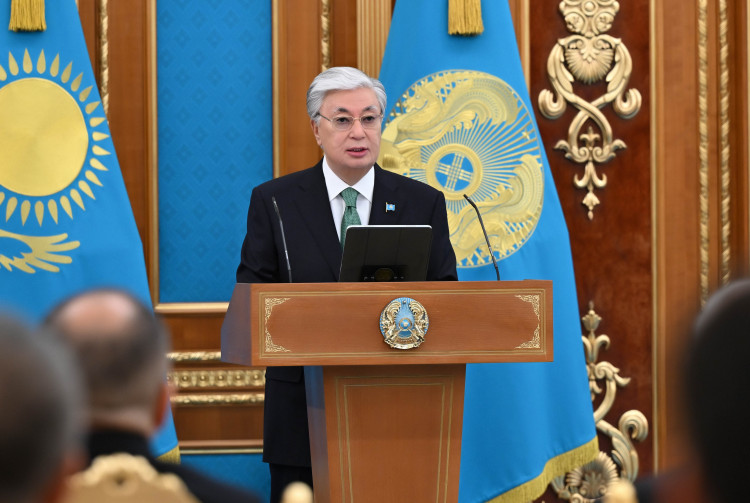ASTANA – President Kassym-Jomart Tokayev outlined key tasks for Kazakhstan’s scientific development during a meeting with domestic scientists on April 10, ahead of Science Workers Day. At the event, he presented state awards to a group of citizens and handed over apartment keys to several young scientists, reported Akorda.

Kassym-Jomart Tokayev at the meeting with Kazakhstan’s scientists. Photo credit: Akorda
Tokayev emphasized that funding for science has increased 3.5 times with the support for young researchers in recent years. Currently, Kazakhstan has over 25,000 scientists, half of whom are under 40, indicating a new generation’s formation.
Nuclear science
One of the President’s strategic tasks is developing nuclear science and technology. He highlighted the role of institutions such as the Institute of Nuclear Physics in Almaty and the National Nuclear Center in Kurchatov in conducting fundamental and applied research and training specialists.
“Nuclear generation is not only a stable energy source, but also a starting point for new areas in the economy and science. We are talking about nuclear medicine, hydrogen energy, water desalination, synthetic fuel production, small modular reactors, and others. To achieve a breakthrough in these areas, it is necessary to strengthen the research infrastructure, enhance scientific work, and modernize engineering education,” Tokayev said.
He noted that nuclear energy should be a top priority at the next meeting of the National Council on Science and Technology under the President.
Artificial intelligence
Tokayev also underscored the strategic importance of artificial intelligence (AI) and digitization.
“The key to our country’s success in this area should be human capital – talented and educated citizens. Therefore, we will strengthen the training of IT specialists and teach AI skills to students and schoolchildren,” he said.
According to the President, universities should become pioneers in new research and innovation. He believes educational institutions pay more attention to training specialists than scientific developments. Even though this is their main function, education and science should go hand in hand.
Science-industry cooperation
Scientific organizations have earned over 40 billion tenge (US$76.7 million) in the last five years. Kazakhstan attracted 14.5 billion tenge (US$27.8 million) of private investment in science, creating more than 2,000 new jobs.
The President cited Satbayev University as a striking example of successful collaboration between academia and industry. Its scientists developed a new technology to produce high-purity selenium, increasing its market value 15-fold and generating an additional 1.2 billion tenge (US$2.3 million) in profit.
He also praised young academician Durvudkhan Suragan, whose mathematical physics research is used in cryptography and data protection systems, an essential field in the digital era.
Tokayev urged domestic enterprises to invest in science, noting that several industrial firms now allocate 1% of their revenue to research. He also stressed the importance of linking businesses with universities and research centers.
Growing global instability
Commenting on the unstable situation in world markets, Tokayev said current events may become a harbinger of a global economic storm.
“Due to the tariff wars of all against all, production and trade chains are being disrupted, markets are falling, and raw material prices are highly volatile. This will inevitably affect all countries, including Kazakhstan. Although a 90-day moratorium on introducing high tariffs has now been taken, the market is still very unstable,” he noted. “But I am sure there is no reason to panic. We have always confidently overcome all challenges, focusing our efforts on priority areas.”
Despite the unfavorable external factors, Tokayev confirmed that Kazakhstan will continue all key infrastructure projects and works as planned. He stated that crises clearly show the presence or absence of business qualities of leaders, creating new opportunities, which is extremely important for maintaining the sustainability of the national economy and social stability amid radical external shocks.


